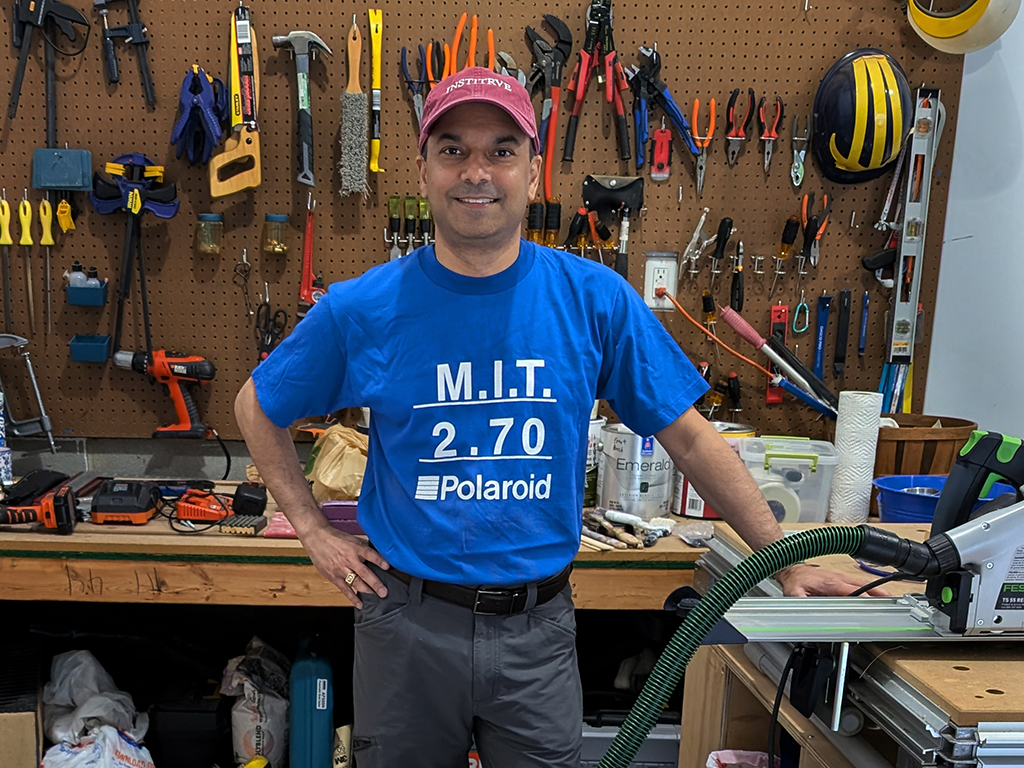Ravi Patil ’93, SM ’95, IT Executive and Storyteller
During his six years at MIT, Ravi Patil ’93, SM ’95 kept a journal. The 120-page record chronicled “triumph, defeat, and everything in between,” but after he left the Institute it was packed away in a box where it sat for years, mostly forgotten.
“Late one night during the pandemic, I cracked open my MIT boxes, effectively opening a personal time capsule,” he recalls. “I flipped through my Course 2 bibles in disbelief and eventually found the journal. Once in my hands, I couldn’t put it down. I was so inspired and moved by reawakened memories that I did the geekiest thing possible over the next few days: I dictated the whole journal into LaTeX, something I had not used since MIT.”
 Ravi Patil ’93,SM ’95
Ravi Patil ’93,SM ’95Immersing himself in the richness of his own MIT experience led him to wonder about the experiences of others. “I knew that many aspects of my story were similar to others, but I also knew there would be differences, mysterious unknowns,” he says. “My curiosity to hear, craft, and share the powerful human stories of the MIT community led me to launch INSTITRVE.”
INSTITRVE, which is pronounced “institrue,” chronicles True stories about MIT. Patil describes it as a “trove of wonder, discovery, and madness.” Guests have included an alumna who is using her engineering skills to unravel the mystery of her husband’s puzzling disease, a Jeopardy! Champion facing the unintended consequences of fame, and a real-life Will Hunting. Episodes 2 and 3 tell the story of Course 2 alumnus Robert Ratonyi ’63, SM ’64 who, as a six-year-old, survived the Holocaust. Ratonyi recounts growing up in Hungary, and eventually making his way to MIT to complete his undergraduate and graduate degrees.
“What strikes me in each episode is that there is something invariant and timeindependent about MIT culture. Whether I speak with an alum from the 1950s, 1990s, or 2020s, we all have a shared sense of curiosity and wonder as well as a tinge of lunacy that compelled us to willingly undertake the MIT workload,” he says.
The MIT experience develops a combination of analytical thinking, hands on skills, and perseverance to be successful in anything that you pursue, he says, with the caveat that communications skills are paramount to this success.
“During your journey towards that perfect job after MIT, you will interact with a diverse range of people. Some will have deep technical skills and easily grasp your accomplishments. Others will have no technical background and may not fully understand your unique skills. There is one guaranteed way to create meaningful impressions with both of these audiences: personal storytelling. Like a muscle, this essential skill becomes stronger with exercise.”
Today, Patil is director of product management and strategy at Broadcom, where he is responsible for the mainframe security and compliance software portfolio. Before Broadcom, Patil served as head of product marketing and held marketing and strategy leadership roles at CA Technologies and IBM. He began his career in the auto industry working at Ford Motor Company, where he designed fuel system components and streamlined manufacturing processes for worldwide vehicle platforms.
“As mechanical engineers, systems thinking is a natural part of our approach. The experience of working at a global company piqued my interest in a broader set of systems (marketing, finance, sales) required to bring products to market,” he says. “I went back to school full time for an MBA [at the University of Michigan] and have been in the information technology industry ever since, where I’ve led marketing, strategy, and product management teams.”
He says a woodworking hobby helps him stay connected to the tactile experience of mechanical engineering, and he stays actively connected to MIT through a variety of volunteer activities. He’s currently serving on the Board of Directors of the MIT Alumni Association and he previously served as North Carolina Research Triangle Park (RTP) alumni club president, educational counselor, and class officer. He’s also instructed personal storytelling seminars for MIT students.
“We live in a time where the question of what it means to be human is being challenged by things such as artificial intelligence, biological engineering, and climate change,” he explains. “I feel that exploring our human journeys and the consequences of our collective actions is critical to not only our wellbeing, but our very existence.”